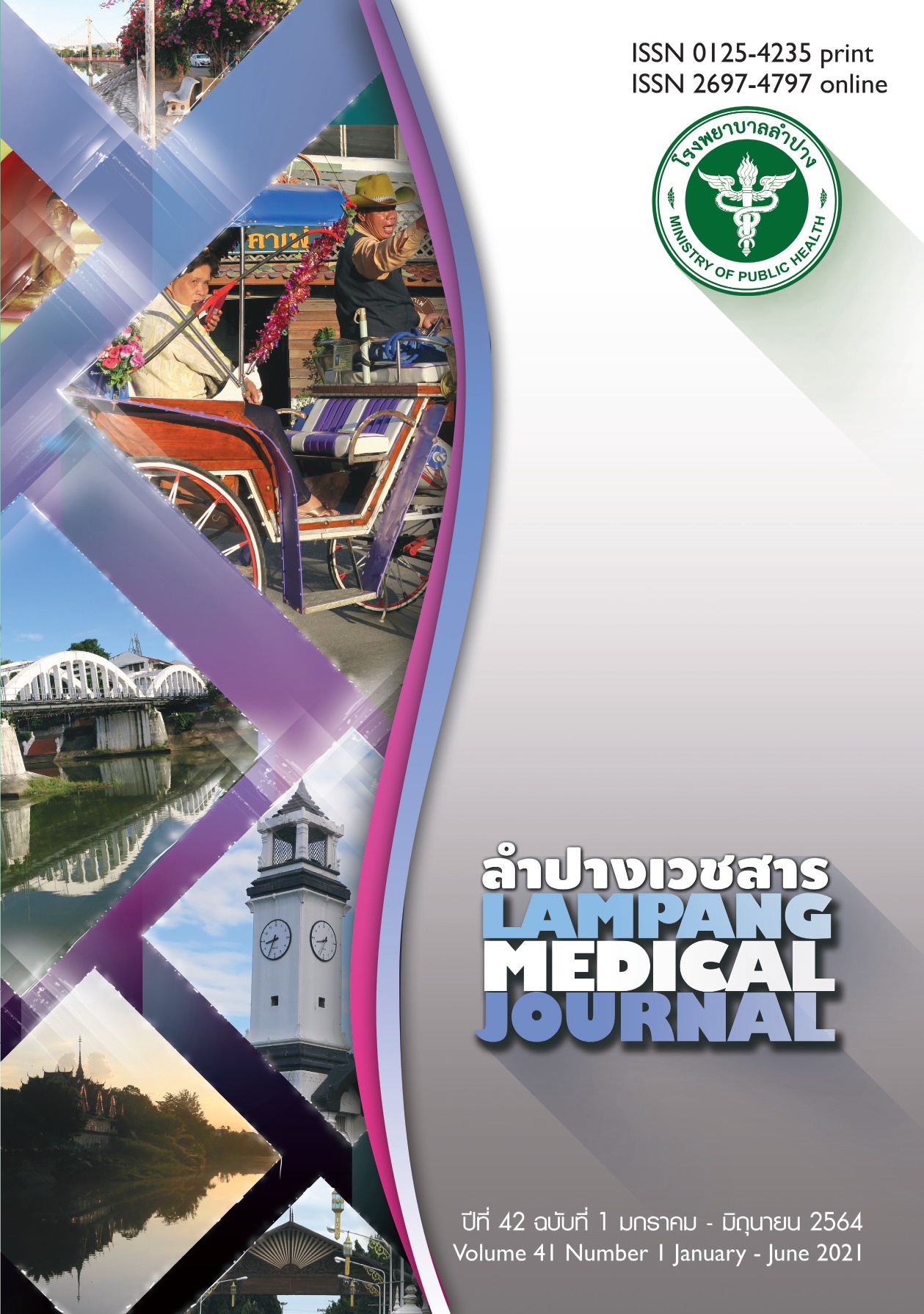Efficacy, Tolerability and Side Effects of First-line Chemotherapy in Elderly Patients with Advanced Non-Small Cell Lung Cancer at Lampang Hospital
Main Article Content
Abstract
Background: Non-small cell lung cancer (NSCLC) is the most common type of malignant lung tumor and usually diagnosed in patients aged ≥65 years. Chemotherapy is the standard of care for advanced stage in fit patients. Those who accepted palliative treatment get poor survivorship.
Objective: To determine the efficacy, tolerability and side effects of the first-line regimen for treating advanced NSCLC in the elderly patients, and to compare the survival between chemotherapy and supportive treatment.
Material and method: A retrospective cohort study was conducted among the patients aged ≥60 years diagnosed with advanced NSCLC at Lampang Hospital between 1 January 2017 and 30 April 2020. The chemotherapy group received first-line (platinum-based) regimen. Clinical data included the Eastern Cooperative Oncology Group performance status (ECOG PS), response rate, number of cycles and median overall survival. Data were compared between
chemotherapy and supportive care group. Factors related with survival were analyzed using Cox regression analysis.
Results: 90 patients were enrolled, 55 received chemotherapy (61.1%) and 35 received supportive care (38.9%). 76% of patients in chemotherapy group had ECOG PS 1 and 31.4% in supportive care group had ECOG PS 3–4 (p<0.001). The average course was 4 cycles (range 1–6) and 28 cases (51%) completed the 6th cycle. The overall response rate was 21.8% and the clinical benefit rate was 58.2%. Twenty-one patients received the second-line regimen and
nine received the third-line regimen. The most common side effects were anemia (40%) and asthenia (33%). The median progression free survival of the first-line chemotherapy was 140 days. The median overall survival was 256 days in chemotherapy group and 49 days in BSC group. Chemotherapy was associated with 63% reduction the hazard of death (HR 0.37, 95%CI
0.23–0.57, p<0.001). Factors related with decreased and increased mortality were serum albumin >3.5 g/dl (HR 0.45, 95%CI 0.22–0.92, p=0.030) and male (HR 2.43, 95%CI 1.10–5.35, p=0.028) respectively.
Conclusions: Chemotherapy provided better survival than supportive care among elderly patients with advanced NSCLC. The first-line regimen had good response rate and acceptable side effects.
Article Details
บทความที่ส่งมาลงพิมพ์ต้องไม่เคยพิมพ์หรือกำลังได้รับการพิจารณาตีพิมพ์ในวารสารอื่น เนื้อหาในบทความต้องเป็นผลงานของผู้นิพนธ์เอง ไม่ได้ลอกเลียนหรือตัดทอนจากบทความอื่น โดยไม่ได้รับอนุญาตหรือไม่ได้อ้างอิงอย่างเหมาะสม การแก้ไขหรือให้ข้อมูลเพิ่มเติมแก่กองบรรณาธิการ จะต้องเสร็จสิ้นเป็นที่เรียบร้อยก่อนจะได้รับพิจารณาตีพิมพ์ และบทความที่ตีพิมพ์แล้วเป็นสมบัติ ของลำปางเวชสาร
References
กระทรวงสาธารณสุข, กรมการแพทย์, คณะกรรมการจัดทำแผนการป้องกันและควบคุมโรคมะเร็งแห่งชาติ.
แผนการป้องกันและควบคุมโรคมะเร็งแห่งชาติ National Cancer Control Programme พ.ศ.2561– 2565. นนทบุรี:กระทรวงสาธารณสุข; 2561.
Santos FN, Cruz MR, Riera R. Chemotherapy for advanced non-small-cell lung cancer in elderly
patients. JAMA Oncol. 2016;2(12):1645–6.
Gridelli C. The ELVIS Trial: a phase III study of single-agent vinorelbine as first-line treatment in
elderly patients with advanced non-small cell lung cancer. Elderly Lung Cancer Vinorelbine
Italian Study. Oncologist. 2001;6 Suppl 1:4–7.
Sacher AG, Le LW, Leighl NB, Coate LE. Elderly patients with advanced non-small cell lung cancer in phase III clinical trials: are the elderly excluded from practice-changing trials in advanced nonsmall cell lung cancer?. J Thorac Oncol.2013;8(3):366–8.
Gridelli C, Langer C, Maione P, Rossi A, Schild SE : Lung cancer in the elderly. J Clin Oncol. 2007;25(14):1898–907.
Oken MM, Creech RH, Tormey DC, Horton J, Davis TE, McFadden ET, et al. Toxicity and response criteria of the Eastern Cooperative Oncology Group. Am J Clin Oncol. 1982;5(6):649–55.
National Cancer Institute - Cancer Therapy Evaluation Program. Common Toxicity Criteria for
Adverse Events v5.0 (CTCAE) [Internet]. 2017 Nov [cited 2021 Mar 28]. Available from: https://ctep.cancer.gov/protocolDevelopment/electronic_applications/ctc.htm#ctc_50
Eisenhauer EA, Therasse P, Bogaerts J, Schwartz LH, Sargent D, Ford R, et al. New response evaluation criteria in solid tumours: revised RECIST guideline (version 1.1). Eur J Cancer. 2009;45(2):228–47.
สำนักงานปลัดกระทรวงสาธารณสุข, กองยุทธศาสตร์และแผนงาน. สถิติสาธารณสุข พ.ศ. 2560. นนทบุรี:กระทรวงสาธารณสุข; 2561.
Takayuki N, Keiko T, Junji U, Yoshiko K, Nobuyo T, Tadaaki Y, et al. Advanced non-small-cell lung cancer in elderly patients: patient features and therapeutic management. Biomed Res Int.
:8202971.
Davidoff AJ, Tang M, Seal B, Edelman MJ. Chemotherapy and survival benefit in elderly
patients with advanced non-small-cell lung cancer. J Clin Oncol. 2010;28(13):2191–7.
Sutepvarnon A, Paradee R. Treatment outcome of elderly patients with advanced non-small cell lung cancer treated with supportive care and supportive care plus chemotherapy or targeted
therapy. Vajira Med J. 2015;59(1):1–10.
Koyi H, Hillerdal G, Andersson O, Kolbeck KG, Liv P, Branden E. Chemotherapy treatment of
elderly patients (≥70 years) with non-small cell lung cancer: a seven-year retrospective study
of real-life clinical practice at Karolinska University Hospital, Sweden. Lung Cancer Int. 2015:317868.
Kim SW, Kim MY, Lee YP, Ryu YJ, Lee SJ, Lee JH, et al. Clinical features and prognostic factors in elderly koreans with advanced non-small-cell lung cancer in a tertiary referral hospital. Tuberc Respir Dis (Seoul). 2013;75(2):52–8.
Ikeda S, Yoshioka H, Ikeo S, Morita M, Sone N, Niwa T, et al. Serum albumin level as a potential
marker for deciding chemotherapy or best supportive care in elderly, advanced non-small
cell lung cancer patients with poor performance status. BMC Cancer. 2017;17(1):797.
Schiller JH, Harrington D, Belani CP, Langer C, Sandler A, Krook J, et al. Comparison of four
chemotherapy regimens for advanced non-smallcell lung cancer. N Engl J Med. 2002;346(2):92–8.
Quoix E, Zalcman G, Oster JP, Westeel V, Pichon E, Lavole A, et al. Carboplatin and weekly paclitaxel doublet chemotherapy compared with monotherapy in elderly patients with advanced
non-small-cell lung cancer: IFCT-0501 randomised, phase 3 trial. Lancet. 2011;378(9796):1079–88.


